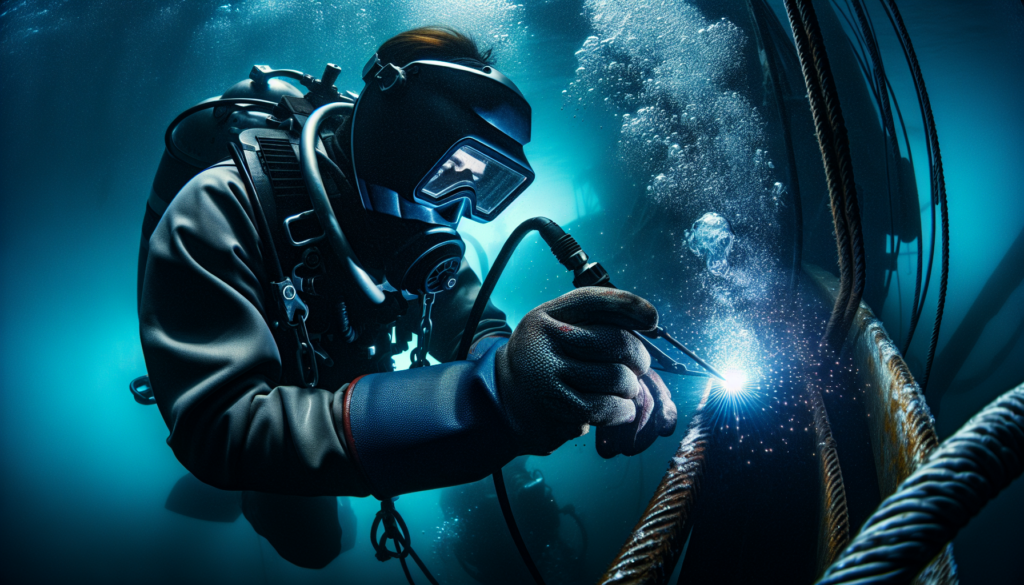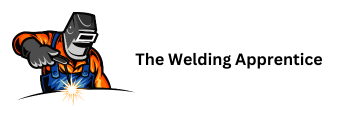Are you curious about the salary prospects in wet welding? Look no further – this article is here to give you a brief overview! Wet welding is a specialized form of underwater welding that involves welding while being submerged in water. It requires a unique set of skills and expertise, making it a niche career option. In this article, we will discuss the average salary range for wet welders, factors that can influence their income, and the potential growth opportunities in this field. By the end of this article, you’ll have a clearer understanding of what to expect in terms of compensation in the exciting world of wet welding.
Overview of Wet Welding
Definition of Wet Welding
Wet welding, also known as underwater welding, is a specialized welding technique that enables welding operations to be carried out underwater. Unlike traditional welding methods, wet welding involves working in a submerged environment, either in a wet or dry suit, allowing welders to perform repairs, maintenance, and construction tasks on structures such as ships, oil rigs, pipelines, and underwater structures.
Importance and Applications of Wet Welding
Wet welding plays a crucial role in various industries, particularly those related to marine, offshore, and underwater construction. It allows for efficient and cost-effective repairs and maintenance of submerged structures, eliminating the need for expensive and time-consuming dry docking or costly disassembly of equipment. Wet welding is particularly vital in maintaining the integrity and safety of offshore oil rigs, underwater pipelines, and submerged infrastructure. Additionally, wet welding also finds application in salvage operations, ship maintenance, and repair of underwater structures.
Challenges of Wet Welding
Wet welding presents a unique set of challenges compared to traditional welding. The primary challenge is working in a highly demanding and hazardous environment. Welders must overcome physical and mental challenges associated with working in limited visibility, dealing with extreme temperatures, and managing the risks of electric shock and decompression sickness. The presence of water and the need for constant monitoring of equipment and safety protocols further add to the complexity of wet welding operations.
Safety Considerations in Wet Welding
Safety is of utmost importance when it comes to wet welding due to the inherent risks involved. Welders must be well-trained in proper safety procedures and equipment use to minimize the chances of accidents and injuries. It is crucial to have proper ventilation, electrical insulation, and grounding to prevent electric shock. Monitoring of gas levels and decompression procedures are also essential to minimize the risk of decompression sickness. Protective gear, such as wet suits, helmets, and gloves, must be worn to mitigate the effects of cold water and underwater hazards.
Factors Affecting Wet Welding Salary
Experience and Skill Level
One of the primary factors influencing a wet welder’s salary is their experience and skill level. As with any profession, the more experience a welder accumulates, the higher their earning potential. Experienced wet welders are in high demand due to their proficiency and ability to handle complex underwater welding tasks. Employers value the expertise gained through years of practical experience, and thus, experienced wet welders often command higher wages.
Certifications and Qualifications
Obtaining relevant certifications and qualifications can significantly impact a wet welder’s salary. Certifications, such as those offered by recognized organizations like the American Welding Society (AWS) and the European Welding Federation (EWF), demonstrate a welder’s expertise and adherence to industry standards. Welders with additional qualifications, such as diving certifications or welding inspector certifications, may have a competitive advantage in the job market and can negotiate higher salaries.
Geographical Location
The geographical location of a wet welder also plays a role in determining their salary. Areas with high demand for wet welders, such as coastal regions or locations with extensive offshore oil and gas operations, often offer higher wages due to increased competition for skilled welders. Additionally, cost of living factors in specific regions may influence salaries, with welders in areas with higher living expenses typically earning more to account for the increased cost of housing and necessities.
Industry Sector
The industry in which a wet welder works significantly impacts their earning potential. While wet welders are employed in various sectors, including oil and gas, marine construction, and underwater maintenance, compensation can vary depending on the sector. Industries with complex and high-risk operations, such as offshore oil and gas, often offer higher salaries to attract skilled welders who can handle the demands and risks associated with their projects.
Company Size and Reputation
The size and reputation of the employing company can also affect the wet welder’s salary. Larger companies or well-established industry leaders often have the resources to offer higher wages and provide comprehensive benefits packages to attract and retain top talent. In contrast, smaller companies or startups may have more limited budgets, resulting in lower salaries. However, smaller companies may offer other incentives, such as opportunities for growth and advancement, which can compensate for the lower initial salary.

Average Wet Welding Salaries
Entry-Level Wet Welder Salary
The average salary for entry-level wet welders typically ranges from $40,000 to $60,000 per year. These welders are at the beginning of their careers and may have recently completed their training and certification programs. It is important to note that actual salaries may vary based on factors such as location, company size, and industry.
Experienced Wet Welder Salary
Experienced wet welders with a solid track record and several years of underwater welding experience can expect to earn significantly higher salaries. On average, experienced wet welders earn between $60,000 and $100,000 per year, depending on their qualifications, expertise, and the complexity of the projects they are involved in.
Average Wet Welding Salary by Industry
Wet welding salaries can vary significantly depending on the industry in which a welder is employed. In the offshore oil and gas sector, for example, wet welders may earn salaries ranging from $70,000 to $120,000 per year due to the high demands and risks associated with offshore operations. On the other hand, wet welders employed in marine construction or ship repair industries may earn salaries ranging from $50,000 to $80,000 per year.
Regional Variations in Wet Welding Salaries
Salaries for wet welders may also vary based on the regional demand for their skills. Coastal regions with a strong presence of marine and offshore industries tend to offer higher salaries to attract and retain skilled wet welders. For example, wet welders in the Gulf Coast region of the United States may earn higher salaries compared to those in inland areas, where the demand for their services may be lower.
Additional Earnings and Benefits
Overtime Pay
Wet welders may have the opportunity to earn additional income through overtime pay. As underwater welding projects often involve tight deadlines and time-sensitive repairs, welders may be required to work extended hours or on weekends. Overtime pay, typically at a higher hourly rate, can significantly increase a welder’s overall earnings.
Bonuses and Incentives
Some employers offer bonuses and incentives to motivate and reward their wet welders. These may include performance-based bonuses, safety bonuses, or productivity incentives. Welders who consistently meet or exceed project goals or demonstrate exceptional skills and commitment may receive additional financial rewards, further enhancing their total compensation.
Benefits and Perks
In addition to their base salary, wet welders often receive benefits and perks as part of their employment packages. These may include health insurance, retirement plans, paid time off, and allowances for travel or living expenses while on extended projects. The value of these benefits can vary depending on the employer and industry, but they can significantly contribute to a welder’s overall compensation and job satisfaction.

Wet Welding Salary Comparison with Dry Welding
Differences in Salary Structures
When comparing wet welding salaries to those of dry welding, some key differences exist. Dry welding refers to welding performed in a traditional, non-submerged environment. Dry welders typically have a broader range of job opportunities, as they can work in various industries such as construction, manufacturing, automotive, and aerospace. As a result, dry welders often have more stable employment and higher average salaries compared to wet welders.
Factors Influencing the Variation
The variation in salary between wet and dry welders can be attributed to several factors. The specialized training and certifications required for wet welding, along with the demanding and hazardous nature of the job, contribute to the scarcity of skilled wet welders. This scarcity creates a higher demand for their services, thereby driving up wages in specific sectors, such as offshore oil and gas. Additionally, the offshore nature of many wet welding projects often involves more extensive travel, longer work hours, and increased physical and mental demands, which also influence salary discrepancies.
Tips for Increasing Wet Welding Salary
Continuing Education and Skill Development
To enhance their salary potential, wet welders should invest in continuing education and skill development. By staying updated with the latest welding techniques, technologies, and safety practices, welders can position themselves as valuable assets to their employers, leading to potential salary increases.
Seeking Advanced Certifications
Obtaining advanced certifications beyond the basic welding qualifications can significantly impact a wet welder’s salary. Specialized certifications in areas such as welding inspection, diver certifications, or underwater welding techniques can make a welder more marketable and eligible for higher-paying positions.
Specializing in High-Demand Welding Techniques
Focusing on high-demand welding techniques, such as hyperbaric welding or welding in specific industry sectors, can lead to increased earning potential. Specializing in these niche areas allows welders to develop unique skills and expertise, positioning themselves as sought-after professionals in their field.
Gaining Experience in Different Industries
Wet welders who gain experience by working in different industries can broaden their skill set and increase their marketability. By diversifying their experience, welders can adapt their skills to various project requirements and increase their earning potential as they gain exposure to different industry sectors.
Career Progression and Salary Growth
Junior Welder
As a junior welder, individuals are typically at the beginning of their wet welding career. At this stage, welders are expected to have completed their training and certification programs and are gaining practical experience under the guidance of more experienced welders. Junior welders often start at the lower end of the salary scale, but with time and experience, they can progress to more challenging roles and higher salaries.
Welder
As a welder gains experience and proficiency in wet welding techniques, they can progress to the role of a full-fledged welder. Welders in this stage often take on more complex projects and can command higher wages based on their expertise and reputation. Salaries for welders may vary based on factors such as industry, location, and employer.
Senior Welder
A senior welder typically has extensive experience and a proven track record in wet welding. Senior welders often take on leadership roles, overseeing projects, and mentoring less experienced welders. Their expertise and leadership skills make them valuable assets to companies, allowing for salary growth and potential bonuses or incentives.
Welding Supervisor/Inspector
After gaining significant experience and demonstrating exceptional skills, welders may advance to supervisory or inspector roles. As welding supervisors or inspectors, individuals are responsible for ensuring the quality and compliance of welding operations, managing teams of welders, and coordinating project timelines. These positions often come with increased responsibilities and higher salaries compared to other welding roles.
Job Outlook and Future Demand
Growth in Marine and Offshore Industries
The job outlook for wet welders remains promising, especially within the marine and offshore industries. As the demand for oil, gas, and renewable energy continues to rise, the need for underwater construction, maintenance, and repair services will also increase. This growth is expected to generate a steady demand for skilled wet welders, resulting in job opportunities with competitive salaries.
Renewable Energy Sector Opportunities
The growing focus on renewable energy sources, particularly offshore wind farms, presents new opportunities for wet welders. Offshore wind turbines and other renewable energy structures require regular inspections and maintenance, creating a demand for wet welders with the expertise to work in these unique environments. The renewable energy sector offers a potential avenue for career growth and increased salary prospects for wet welders.
Impact of Technological Advancements
Technological advancements in wet welding equipment and techniques are also expected to impact the industry and wet welders’ salaries. Innovations such as remote-controlled welding systems and improved monitoring tools can enhance productivity, reduce risks, and increase efficiency. As companies invest in these advancements, there may be a need for trained wet welders who can operate and maintain the new technologies, potentially leading to higher salaries.
Training and Education Requirements
Formal Education in Welding
While not always mandatory, formal education in welding can provide a solid foundation for aspiring wet welders. Many technical schools and community colleges offer welding programs that teach the fundamental principles of welding, metal fabrication, and safety protocols. Acquiring a certificate or associate degree in welding can help individuals stand out in the job market and enhance their earning potential.
Specific Wet Welding Training
In addition to general welding education, wet welders require specific training in underwater welding techniques. Various training programs and courses are available, both through recognized institutions and specialized training schools, that cover topics such as hyperbaric welding, welding in confined spaces, and welding in adverse environments. These specialized training programs ensure that wet welders are equipped with the necessary skills to work safely and effectively underwater.
Apprenticeship Programs
Apprenticeship programs provide a valuable avenue for aspiring wet welders to gain practical experience under the guidance of experienced professionals. These programs typically combine on-the-job training with classroom instruction, allowing apprentices to develop their welding skills while earning a salary. Successful completion of an apprenticeship program demonstrates a commitment to the profession and can lead to enhanced job prospects and higher salaries.
Certifications and Licensing
Obtaining industry-recognized certifications and licenses is essential in the field of wet welding. Certifications such as those offered by organizations like the American Welding Society (AWS) or the International Institute of Welding (IIW) validate a welder’s skills and adherence to industry guidelines. Additionally, divers may need to obtain certifications from reputable diving organizations to ensure they meet the necessary safety standards when working underwater.
Resources and Associations for Wet Welders
Welder Trade Associations
Joining trade associations specific to welding can provide wet welders with valuable networking opportunities, access to industry resources, and the chance to stay updated with the latest developments in the field. Associations such as the American Welding Society (AWS), the International Brotherhood of Boilermakers, Iron Ship Builders, Blacksmiths, Forgers, and Helpers (IBB), and the International Institute of Welding (IIW) are highly regarded and offer numerous benefits to members.
Professional Networking Platforms
Online professional networking platforms can help wet welders connect with other industry professionals, explore job opportunities, and gain insights into the latest trends and technologies. Platforms such as LinkedIn offer dedicated groups and forums for welders and can serve as a valuable resource for career advancement and salary growth.
Welding Training schools and Institutes
Various welding training schools and institutes provide comprehensive programs and courses specifically tailored to wet welding. These institutions offer hands-on training, theoretical knowledge, and guidance from experienced instructors, helping aspiring wet welders gain the skills and certifications necessary for a successful career in underwater welding. Some notable institutions include The Underwater Centre, Divers Institute of Technology (DIT), and International Diving Institute (IDI).
By considering the factors that affect wet welding salaries, exploring additional earning opportunities, and following tips for increasing their earnings, wet welders can maximize their income potential. With promising job prospects in growing industries and the continuous development of technological advancements, wet welding offers a rewarding career path with the potential for salary growth and professional advancement.
